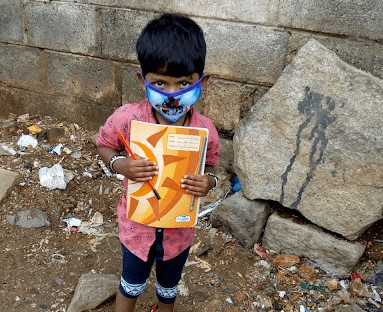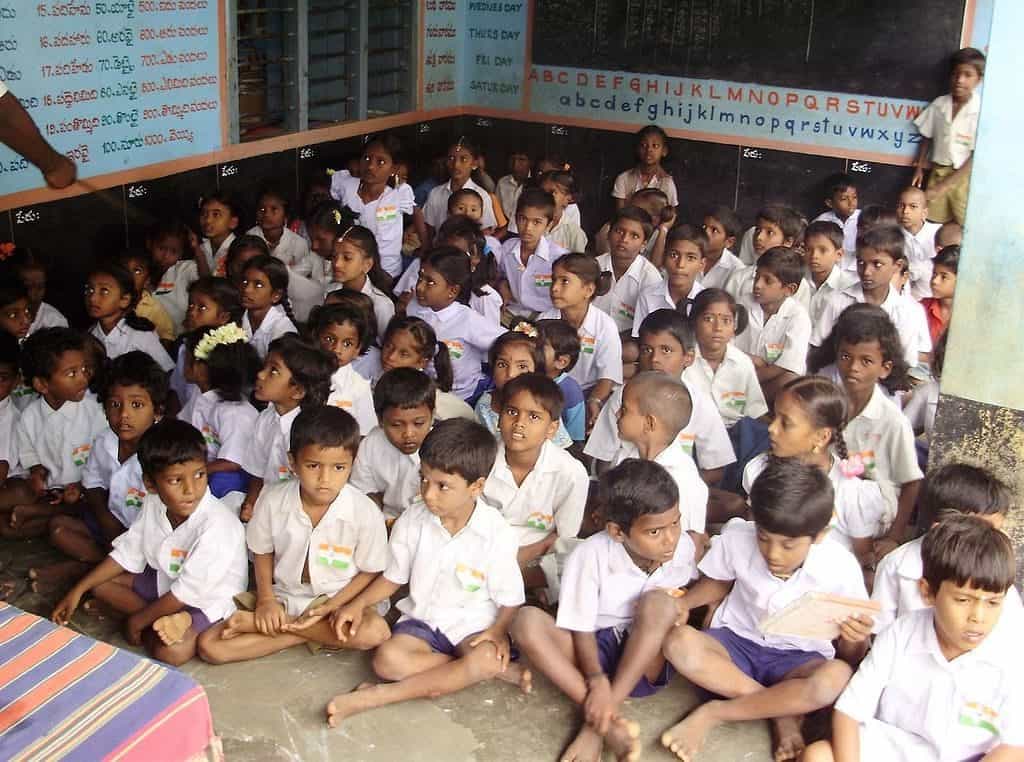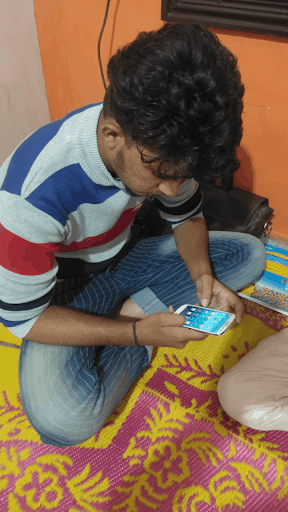Basamma thinks her children’s school should not have promoted them this year. A resident of Chinnapanahalli near Whitefield, Basamma, who makes a living by doing domestic work, sends her daughter and son to the nearby government school. The school had no online classes at all. Yet, her daughter is now in 7th standard and her son in the 8th.
“They only watched lessons on DD Chandana channel (on TV) and spent most of their time idling and playing. They learnt nothing,” Basamma says. Before COVID struck last year, Basamma used to send them to tuition classes. But that stopped with the lockdowns and Basamma losing work.
Though not by much, things are slightly better this year. She says the kids still watch Chandana TV. Their school holds no online classes, but sends study material through Whatsapp (The two children share Basamma’s smartphone to access the lessons). But they have not received the textbooks. So, they can’t understand anything, Basamma says.
The worried mother has restarted tuition classes during the last three weeks (the tutor apparently settled for lower fees) hoping it will help them catch up.
From August 23, physical classes began for 9th to 12th standards across Karnataka. The State government is yet to take a decision for classes 1-8. Even if physical classes do resume for all grades, online classes are supposed to continue for the children who do not want to attend physical classes. Even so, government schools in Bengaluru are still not equipped to hold online classes.
The online learning myth
Online classes have been a challenge even in Bengaluru’s high-end private schools. In government schools, live classes have hardly been happening. The learning gap between children in these different categories of schools is expected to only widen.
Most government schools held no online classes at all last year. This year, they are supposed to have online classes, but mostly these are not live classes through platforms like Zoom. The schools send worksheets to students through WhatsApp. The students are expected to work and submit them. (Worksheets are issued by the government’s school board, and include lessons, notes and assignments). Teachers may individually send other study material like notes, also through Whatsapp.

Many children do not have access to a smartphone at all. Their only option is to collect the worksheets from the school physically, and submit them later. Teachers evaluate the worksheets and maintain a file of these for each child. Teachers also clear students’ doubts over phone.
In all four government schools I contacted, many children had no smartphone/internet access. Most children’s parents are construction workers, street vendors, manual labourers, etc, and many are migrants too. Of the four schools, only one was holding live online classes.
Lingesh D S, the headmaster of this government high school (8-10 grades) in B Narayanapura, says that, out of 70 children in classes 9 and 10, only 35-40 have been attending online classes; the rest do not have smartphones. (The admissions for 8th standard was just being completed at the time of this conversation.) “Even if parents have a smartphone, they will need it when going to work. Some with smartphones have no money for data recharge,” says Lingesh.
Even for students who can attend live online classes, the impact is low. The educator says, “There are issues with communication and in understanding if the students are actually interested in the classes. Intelligent kids catch up, but for the rest physical classes are needed.”
The Government Higher Primary Schools (GHPS) in Arekere and Gandhipura have no live online classes as most students have no access. Sudha, headmistress of the Arekere school, says that only around 150 of the 250 students here have access to Whatsapp.
Teachers prepare and upload short videos on WhatsApp for them, on how to solve the problems in the worksheets. For those without Whatsapp access, teachers correct the worksheets and also occasionally visit the students to check on them.
Satyavathi, a teacher at the Gandhipura government school, says 80% of their students have WhatsApp access. If a student is unable to complete the worksheet, they can come to school and get the teacher’s help. However, only 60-70% of all students (with and without WhatsApp) are able to submit the completed worksheets, says she. “The rest aren’t collecting the worksheets from school at all, even when we ask them to”.
The Gandhipura school has students from grade 1 to 7, but has only two teachers and a head teacher. Vacancies have been left unfilled for long.
Read more: What ails Bengaluru’s government schools?
Shyla P, the education department’s Block Resource Coordinator for Malleswaram, explains that as per government guidelines this year, teachers should conduct online classes for children who can access it. But these need not necessarily be live classes. Teaching through WhatsApp messages or YouTube videos is also considered ‘online classes’.
Interestingly, the education department dedicated the month of July for bridge classes. But since many children were not learning at all, bridge courses of just one month was not going to fix a learning gap of an entire academic year.
The teacher’s initiative
In Byrasandra GHPS, English teacher Savitha Sudhakar Shetty started online classes on Zoom by her own initiative in July. Savitha teaches English for Grades 1-7, and has a 40-minute Zoom session every day for all grades combined. But again, of the 100 students overall, only 40 are able to attend the session.

Savitha has designed her session like bridge classes so that some of the learning gap can be fixed: “I think the learning gap is higher in 2nd and 3rd standards because they didn’t learn the basics last year. So I teach 1st standard lessons for Class 1-3. This also helps the older children recall the basics.”
She isn’t aware of any dropouts in the school yet, but believes this will be evident only once physical classes begin.
“Child marriage, exploitation increasing”
Lakshmi Prasanna H K, member of the quasi-judicial body, Child Welfare Committee (CWC) in Bengaluru Urban, too believes that the number of dropouts will be evident only about a month after physical school starts. Identifying these children would be difficult even then, as physical classes won’t be compulsory.
He says, “If you speak to parents now, they will say that the child is enrolled in a government school and was promoted this year. But no one knows what the child is doing at home. No one is being held accountable for whether children are learning or not.”
Lakshmi Prasanna says the number of child marriage cases in Bengaluru have shot up since COVID forced the closure of schools. “Before COVID, if we were seeing 15-20 child marriage cases per year. Now we are seeing that many cases in one quarter alone. This July, we got 3-4 cases.” With girls spending more time at home, CWC is also getting more cases of physical and mental harassment against them, he points out.
It’s not just government school children who are vulnerable. A large proportion of children in Bengaluru go to low-budget private schools. Many parents from low-income groups prefer these schools, hoping their children will get better quality education and learn English.
Old methods
Salma, a domestic worker, has two sons studying in 7th and 9th standards, in lower-budget private schools. Both their schools have been conducting online classes since last year, and Salma had bought devices for them. She feels that online classes are not good enough in any case: “I’m worried that their studies are affected. They used to study well earlier, but with online classes, they are distracted and are not learning properly.”
Due to her job loss, Salma had to move her younger son to a cheaper, lower-quality school last year. She also couldn’t afford her elder son’s school fees this academic year, and so he’s not been able to attend his 9th standard classes so far.

Nagasimha G Rao, Director at the NGO Child Rights Trust, points out that many private schools did not hold online classes initially because the parents had not paid fees. “Now they are holding live classes, but quality is an issue. The teacher goes on speaking, like in a regular classroom. But in an online class, new methods and technologies should be used to engage children.”
He points out that there would be many children in the class, and the teacher may not be able to see or hear them. The child may not be listening at all, and the teacher wouldn’t know. He adds that other factors like different schools holding classes at different timings, parents interfering in the classes, also distracts children.
Online education policy needed
Nagasimha says, “Whether in government or private schools, no one is monitoring how classes are going on. Child Rights Trust has written to the government many times to create a policy for online education, but there has been no response,” he says.
Read more: “Online classes are critical for underprivileged children during COVID”
“First, the government should ensure devices for all children. The funds usually allocated for bicycles, uniforms, etc can be used for this purpose this year. Public WiFi can be arranged in localities so that students have internet access. Besides this, government should have an online education policy on the methods teachers should use to take classes, on class timings, ensuring safety of children online, etc.,” Nagasimha says.
[But what about higher-end private schools? Are they able to better handle online classes and reduce the learning gap? We explore this in Part 2 of this series]